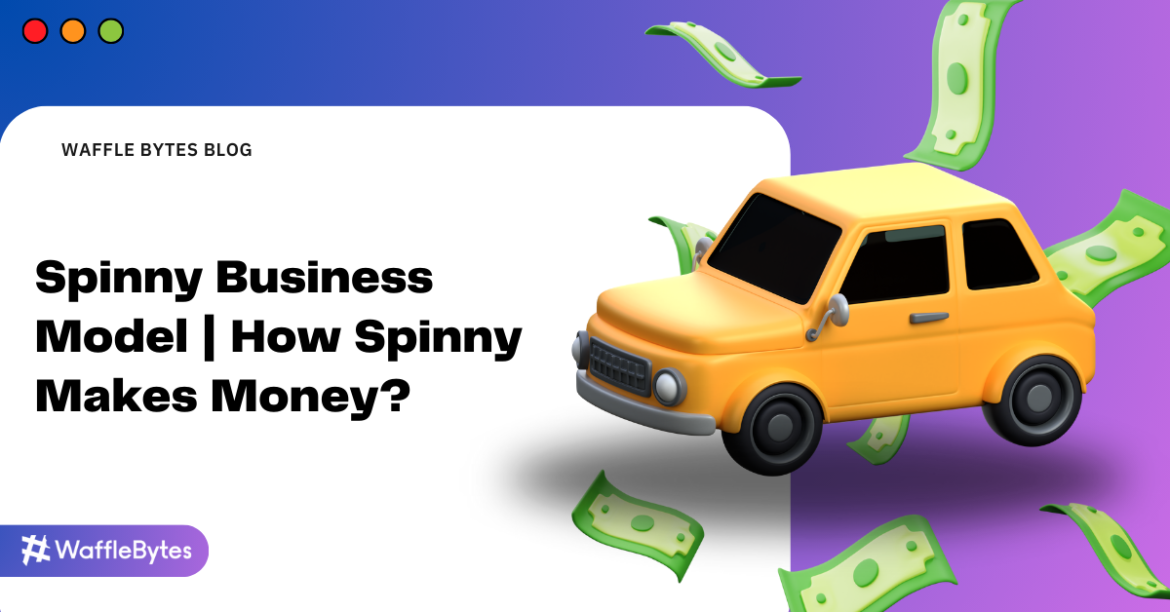The secondhand car market in India has seen remarkable growth in the last decade. Many people prefer buying used cars instead of new ones. Why? It’s simple—used cars are more affordable, and you don’t stress about those tiny scratches or dents that are bound to happen! Spinny is a brand that capitalized on this growing trend and built a business model that has made it a leader in the industry. Let’s break down Spinny’s business model and see how they make money.
What Is Spinny?
Spinny is an online platform that makes it super easy for people to buy or sell used cars. Founded in 2015 by Ramanshu Mahaur, Niraj Singh, Ganesh Pawar, and Mohit Gupta, Spinny is now a trusted name in the used car market. The platform offers a wide range of certified pre-owned cars and provides end-to-end services, including financing, warranties, and after-sales support.
What makes Spinny special is its focus on transparency and trust. Every car on Spinny goes through rigorous inspection and certification processes, so customers know they’re getting quality vehicles.
How Does Spinny Work?
Spinny’s business model is simple yet effective. Here’s how it works:
- Direct Purchase from Car Owners: Spinny buys cars directly from their owners instead of acting as a middleman. They evaluate the car, offer a price, and take custody of the vehicle if it meets their quality standards. This ensures that customers selling their cars get a hassle-free experience and instant payment.
- Car Certification Process: After acquiring a car, Spinny performs a rigorous inspection to ensure it meets quality standards. This includes checking the car’s history, service records, and conducting technical inspections.
- Selling Certified Cars: Once the cars are certified, they’re listed on the Spinny platform. Customers can browse through detailed listings that include high-quality photos, car specifications, and transparent pricing.
- Phygital Experience: Spinny uses a hybrid model, combining online and offline methods. Customers can explore cars online, but they can also visit Spinny hubs for test drives and in-person evaluations.
- Value-Added Services: Spinny provides extra services like financing, extended warranties, home delivery, and even home test drives, making the car-buying process as smooth as possible.
How Spinny Makes Money
Spinny has several revenue streams that make its business model highly profitable. Here’s how they do it:
1. Car Sales
- Spinny buys used cars from owners, refurbishes and certifies them, and then sells them at a markup. This price difference between the buying and selling price is a major source of revenue.
- They source cars not just from individual sellers but also from dealerships and auctions, giving them a wide inventory to work with.
2. Value-Added Services
Spinny charges customers for additional services such as:
- Car inspections: Sellers pay Spinny to inspect their cars.
- Extended warranties: Buyers can opt for additional protection plans for their cars.
- Financing options: Spinny partners with financial institutions to provide car loans, earning a commission in the process.
3. Commission on Sales
Spinny also serves as a platform where private sellers can list their cars. In these cases, Spinny helps facilitate the sale and earns a commission for each successful transaction.
4. Partnership Programs
Spinny collaborates with banks, insurance companies, and service providers. When customers use these services through Spinny, the company earns referral fees or commissions.
You Can Also Read: Traditional Marketing VS Digital Marketing
Spinny’s Financials
Spinny has grown rapidly over the years. Here are some quick stats:
- In FY23, Spinny reported a revenue of ₹3,259.7 crore, although it incurred losses due to high operational expenses.
- By FY24, Spinny’s revenue rose to ₹3,725 crore, while their losses reduced, indicating better cost management and higher sales volume.
Spinny’s Unique Selling Point (USP)
What sets Spinny apart is its customer-first approach. The company ensures that every car meets strict quality checks and offers:
- Instant payment for sellers.
- Transparent pricing with no hidden charges.
- Seamless documentation handling.
- Home delivery and home test drives for buyers.
This end-to-end control over the process has made Spinny a trusted name in the market.
SWOT Analysis of Spinny
Here’s a quick look at Spinny’s strengths, weaknesses, opportunities, and threats:
Strengths:
- Rigorous car certification process.
- Transparent pricing and customer-centric services.
- Financing options and value-added services.
Weaknesses:
- Higher prices compared to competitors.
- Slower growth in new markets.
Opportunities:
- The Indian used car market is expanding rapidly.
- More financing and after-sales services can boost revenue.
Threats:
- Increasing competition from both local and international players.
- The need for continuous tech upgrades to stay ahead.
Conclusion
Spinny is changing how Indians buy and sell used cars. By cutting out middlemen, offering transparent pricing, and providing top-notch services, Spinny has built a reliable platform that caters to both buyers and sellers. Its focus on trust, convenience, and quality has made it a leader in the used car market.
As the demand for pre-owned vehicles continues to rise, Spinny is well-positioned to grow even further. Whether you’re looking to buy or sell a car, Spinny ensures you get the best deal with minimal effort.

